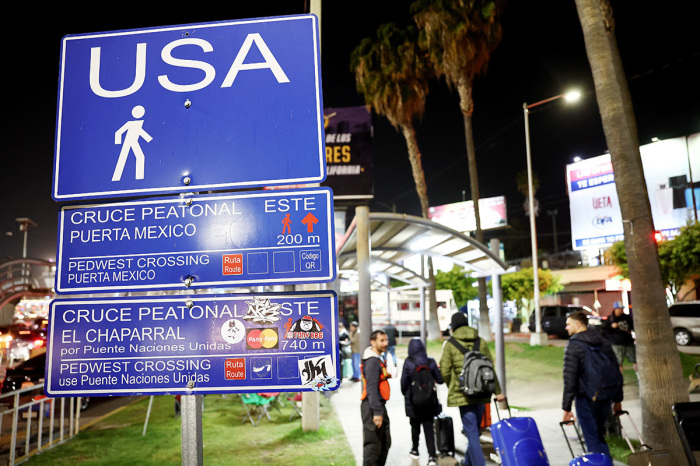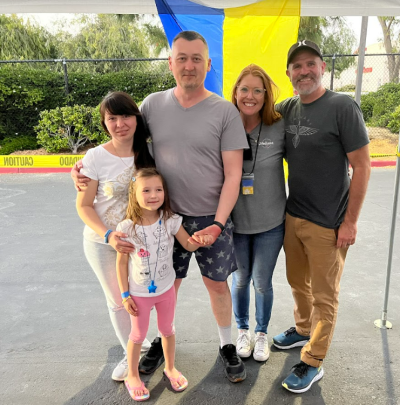California church sheltering Ukrainians seeking refuge in America: 'It was just natural'

As thousands of Ukrainians crossed the border from Tijuana seeking refuge in the United States, a California church seized the opportunity to demonstrate Christ's love by offering them shelter.
Since Russia's war in Ukraine began in February, Calvary Church San Diego in Chula Vista, California, has assisted the Ukrainians by supplying medicine to the country and aiding in rescue efforts. The church also started providing shelter to Ukrainian refugees who started arriving through the U.S. and Mexico border several weeks ago.
In an interview with The Christian Post, Calvary Pastor Phil Metzger said the church has a "vested interest" in Ukraine, as it has 25 Calvaries there within its network of churches. He estimated that the church is about 15 minutes away from the U.S. and Mexico border.
The church assisted refugees at the border after Metzger received a message from a longtime missionary friend who runs a church in Sacramento. Aware of Calvary's proximity to the border, Metzger's colleague asked if he was interested in helping the Ukrainians there.

"We were already praying; we were already involved," Metzger said. "When we heard about the opportunity at the border, it was just natural; this is what we need to do. This is the right thing for us to be a part of right now."
Metzger and the church staff traveled to the border, offering the Ukrainians they encountered a place to stay for the night. That evening, the Calvary pastor believes about 100 refugees showed up, and from there, it just kept "skyrocketing."
Within the first few days of transporting Ukrainians, Metzger traveled to the Tijuana side of the border, eventually teaming up with other individuals helping Ukrainian refugees. One group would transport refugees from the airport to the border while another took them to Calvary.
Everyone wore badges of the Ukrainian flag to help refugees identify them, building a trustworthy reputation the more they ventured to the border. Metzger said that as word spread about their work, many refugees approached them who were already familiar with the aid they provided.
Calvary invented a numbering system through a church application called People Center to help account for the thousands of Ukrainians coming through the border. Individuals typically use the application to check themselves and their children in when they show up for church. The new numbering system allowed Metzger's team to create a "digital line" and put people with medical emergencies at the front.
Due to the high number of refugees arriving at the border, Calvary has housed them at the church and in the homes of 100 church members.
Metzger said finding 100 members willing to house refugees was "not hard." People could sign up to help in the church foyer, and many did.
"People were inspired, honestly," he said. "They just saw the immensity of the need and jumped into it."
Church members attempting to converse with Ukrainians in their homes typically used Google Translate. But local Russian and Ukrainian communities also helped Calvary communicate with the refugees.
The church even held services in Russian, but Metzger said it doesn't do that anymore, as their church was only a short-term place of refuge. While services are held in English, the pastor said several Ukrainians attended, and some were baptized at a recent Easter service.
Local businesses, restaurants and an assortment of churches in the area also supported Calvary's efforts. Since the church only provided housing for a few days, organizations like the Christian disaster relief group Samaritan's Purse assisted them with long-term resettlement.
The refugees staying temporarily at Calvary were allowed to remain in the U.S. for one year while on Humanitarian Parole, which allows individuals to stay in the country without an immigrant or non-immigrant visa. From what Metzger observed, most of the refugees were eager to return home.
"'My work is gone. The house that we lived in was destroyed. We have nowhere. This is our only option.' Young children would always say things like, 'I don't want to be in America. I want to go home.' We heard those things a lot," he said. "They wanted to be back in their home, in their bed, in their life."
According to UNHCR data, over 5 million people have fled Ukraine since the Russian invasion began on Feb. 24.
The worship leader was unsure of the exact number of refugees his church housed, but said they had at least 400 people coming in each night for a couple of weeks.
According to reliefweb, Mexican officials estimate that between 10,000 and 20,000 Ukrainians traveled to the U.S. through the border. Metzger said his team "took care of the lion's share of that."
Calvary's relief efforts in Ukraine have cost about half a million dollars, but Metzger said housing Ukrainians at the church or in members' homes was "very cheap" in comparison. Relief efforts in the war-torn country were funded by donations through the church's website.
The pastor said that members were "generous" with their money, and members covered the potential costs of housing another person themselves. He assumed the church might have some additional electricity bills from sheltering people, but noted that Calvary also uses solar energy.
The Biden administration announced its "Uniting for Ukraine" program on April 21, advising Ukrainians to cease entering the country through Mexico. Instead, the program will allow refugees to migrate from Europe to the U.S. if they have a sponsor there and give them two years of Humanitarian Parole. Refugees were invited to start submitting their online applications Monday.
With no more refugees coming through the border, Calvary has stopped sheltering them, but Metzger said the church would continue focusing on its relief efforts in Ukraine.





























